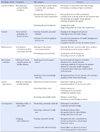Abstract
Methods
The data were collected from 9 female students sampled from two universities. The grounded theory of Strauss and Corbin (1990) was applied.
Results
As a result, 40 concepts, 16 subcategories, and seven categories were deduced from open coding. Emerged seven major categories were as followings: (1) Recognizing of general health condition, (2) Try to actively participate on social activities, (3) Searching for continuous healthy exercising methods, (4) Utilizing of social support system for healthy dieting, (5) Making an individual healthy rhythms, (6) Exhibiting abilities of self-control, (7) Charging self-confidences. The periods of process were divided into 4 stages, the phase of facing self-health, the phase of searching living conditions, the phase of developing individual strategies, and the phase of forming self-confidence. The core variable, "discovering self competencies" incorporated the relationship between and among all categories and explained the process.
Figures and Tables
References
1. Al-Isa AN, Campbell J, Desapriya E, Wijesinghe N. Social and health factors associated with physical activity among Kuwaiti college students. J Obes. 2011. 2011:512363. http://dx.doi.org/10.1155/2011/512363.
2. Brandão MP, Pimentel FL, Cardoso MF. Impact of academic exposure on health status of university students. Rev Saude Publica. 2011. 45(1):49–58.

3. Chang EY, Kim JS, Shin SJ. Health promotion lifestyle according to self-perception of obesity and objective status measured by bioelectric impedance analysis in college women. J Korean Acad Nurs. 2009. 39(5):693–699.

4. Chien-Huang L, Hung-Chou L. How health information affects college students' inclination toward variety-seeking tendency. Scand J Psychol. 2010. 51(6):503–508.

5. Cho H, Lee SJ, Cui RS. Comparison of health promotion lifestyles and self-esteem of Korean and Chinese nursing students. J Korean Acad Psychiatr Ment Health Nurs. 2010. 19(1):22–33.

6. Choi EJ. Increasing healthy lifestyle practice among adult population. Health Welf Policy Forum. 2008. 7:32–41.
7. Choi MO, Kim JY. Survey of eating habits, self cathexis and appearance management behaviors in relation to BMI in college women. J Korean Soc Cosmetol. 2008. 14(2):605–613.
8. Chung WY. Self-discrepancies about body image perception of women' students participating cultural physical education class in university with the viewpoint of socialculture. J Sport Leis Stud. 2011. 45(1):459–466.

9. Furia AC, Lee RE, Strother ML, Huang TT-K. College students' motivation to achieve and maintain a healthy weight. Am J Health Behav. 2009. 33(3):256–263.

10. Hattersley L, Irwin M, King L, Allman-Farinelli M. Determinants and patterns of soft drink consumption in young adults: A qualitative analysis. Public Health Nutr. 2009. 12(10):1816–1822.
11. Kim HK. Factors influencing health pormoting behaviors of university students using Pender's model. Korean J Women Health Nurs. 2006. 12(2):132–141.
12. Kim JM, Koh KW, Kim YJ, Shin YH. Status of and challenges for physical activity in Korean university students. J Korean Soc Health Educ Promot. 2011. 28(5):51–60.
13. Kim JS. Experiences of the elderly with chronic diseases in a health management program. J Korean Soc Health Educ Promot. 2011. 28(3):17–29.
14. Kim MO, Sawano K. Comparison of Korean and Japanese female college students' obesity recognition and life style. J Korean Soc Food Sci Nutr. 2010. 39(5):699–708.
15. Kim M, Lee H. Overestimation of own body weights in female university students: associations with lifestyles, weight control behaviors and depression. Nutr Res Pract. 2010. 4(6):499–506.
16. Ministry of Health & Welfare. Korea health statistics 2009: Korea National Health and Nutrition Examination Survey (KNHANES IV-3). 2010. Seoul: Author.

17. Monroe CM, Thomas DQ, Lagally K, Cox A. Relation of college students' self-perceived and measured health-related physical fitness. Percept Mot Skills. 2010. 111(1):229–239.

18. Morse JM. Ethnography and issue in mixed qualitative research method design. 2005. Seoul: Korea Center for Qualitative Methodology.

19. National Institute of the Korean Language. Standard dictionary of the Korean language. 2012. Retrieved April 1, 2012. from http://www.korean.go.kr.

20. Park IW, Choi CW. A study on collegians' health promoting lifestyle and health locus of control. J Korea Sport Res. 2003. 14(4):131–146.
21. Pettit ML, DeBarr KA. Perceived stress, energy drink consumption, and academic performance among college students. J Am Coll Health. 2011. 59(5):335–341.
22. Seo DC, Torabi MR, Chin MK, Huang SF, Chen CK, Mok MMC, et al. A comparison of factors associated with physical inactivity among east Asian college students. Int J Behav Med. 2012. 19(3):316–323. http://dx.doi.org/10.1007/s12529-011-9167-4.
23. Son EJ. Differences of body image and factors influencing body image through the life span of women. Korean J Woman Psychol. 2011. 16(3):357–377.
24. Strauss AL, Corbin JM. Basics of qualitative research: Grounded theory, procedurse, and techniques. 1990. Newbury Park, CA: Sage Publications.
25. Yoo IY, Joo MH. The effects of health promotion program on the metabolic syndrome risk factors, health efficacy and internal locus of control of university students with body fat obesity. J Korean Soc Living Environ Syst. 2010. 17(6):832–840.




 PDF
PDF ePub
ePub Citation
Citation Print
Print




 XML Download
XML Download